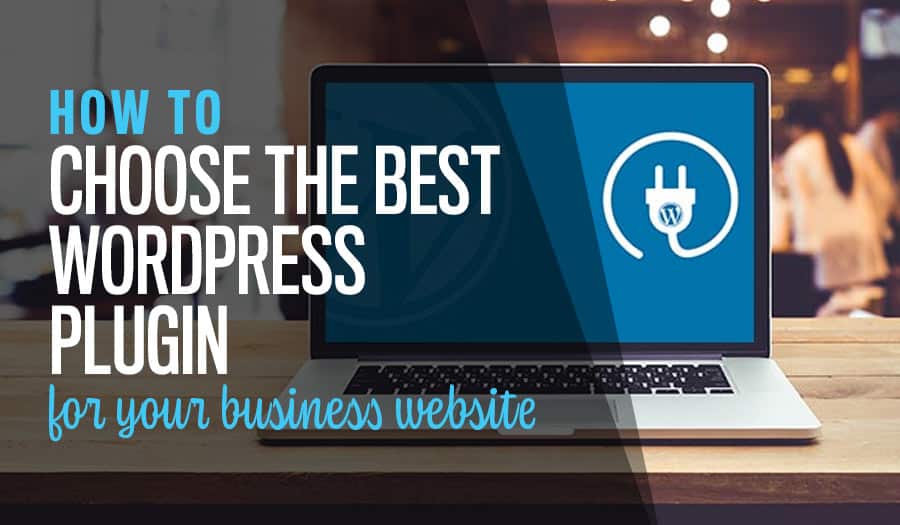With over 30,000 WordPress plugins to choose from, it can be challenging to find the best fit for your business website. Following a few simple steps can make the process much less daunting. Let’s explore How To Choose The Best WordPress Plugin For Your Business Website.
How To Choose The Best WordPress Plugin For Your Business Website
Let’s plan
Before you get started, write down exactly what you want your plugin to do. Make a checklist of the features you are looking for in order of priority, as it may be hard to find one plugin with all the features you seek. The good news is it doesn’t matter if you need two plugins – or more – to get everything you’re after, so long as they all work well together. Keep in mind that the quality, not the number of plugins, counts.
Get searching
The WordPress plugin directory is a great starting point for your search as it offers thousands of plugins with great features on offer. The only drawback is that sometimes it is hard to find exactly what you’re after in a haystack of options.
Admittedly, the WordPress plugin directory’s search feature isn’t great. It’s best to start with a simple Google search or to start with a search of the WPBeginner’s plugins category. Another option is to browse the directory’s list of most popular WordPress plugins.
Under your search results, you should see the total number of times a plugin has been downloaded, the last update date and the rating. Look for a plugin with a good rating that has been recently updated with a good number of downloads.
Which one to download?
It won’t take long before you have found a few plugins you are interested in. You can compare them by opening these plugin pages in new tabs. The wordPress plugin page will detail the plugin’s features, how to use it and what it does. Consider the information against the earlier checklist to decide what best meets your criteria.
Research diligently, then research some more!
If you have a shortlist of plugins that meet your criteria, the next step is to do your research. At Pixel Fish, we are very fussy with which plugins we use on our client’s websites and do thorough research before implementing any.
Keep in mind that activating plugins from the official repository is entirely safe. However, you should use caution if intending to download extensions from other locations. These extensions may contain dangerous code that could be disastrous for you.
Avoid downloading premium plugins offered for free or nulled plugins and bundles of premium plugins that promise the world in one package, as these often contain dangerous malware that allows hackers site access or will render your site unusable.
It is wise to check out the plugin’s reviews by clicking on the rating bars. Have a look at the ratings and reviews, taking note of the total number of ratings the plugin has garnered.
Check out the support section to overview the number of support threads and how many have been resolved within the last two months. While unresolved support threads do not necessarily mean the plugin has issues if the author has not responded to any unresolved threads in the last two months, it is helpful to note that support for the plugin may not be available to you.
Taking the time to view the screenshots is a quick way to see what your plugin will look like on both the front-end and back-end of your WordPress site. A picture can convey a thousand words, and you will usually know whether or not you want to try it after a quick glance.
Lastly, check the FAQs and other notes, as these sub-pages often contain helpful information about how to use the plugin. This section usually contains information about configuring and using the plugin properly that you don’t want to miss!
Testing, testing, 1, 2, 3…
Now you’ve decided on the plugin – or plugins – for your site, don’t forget to test them.
Code that doesn’t follow WordPress coding standards can slow down your website significantly or add unnecessary extra load on your server. You can check and test for this problem using Pingdom – or any other site speed checking service.
You simply enter the URL of your website and run the speed test. Now head back to your website and activate the plugin you need to test. Go back to the speed testing site and run your speed test once more, noting the difference in your results. If you see a significant amount of time added to your site’s speed, it’s time to search for a better plugin.
What happens if my plugin doesn’t work?
WordPress plugins are open source, which means they offer no warranty, and the authors of the plugins are not required to offer you support by answering your questions. Most authors want to do their utmost to assist their users simply because they do care about their code.
If a plugin isn’t working or is giving you an error message, first check the plugin’s compatibility with your other plugins or theme. You can do this by deactivating all your plugins and activating a default WordPress theme. If you test the plugin again and it still doesn’t work, you may want to consider opening a support thread.
To open a support thread, head to the plugin page on the WordPress directory and click on the Support tab. Simply scroll down to find the support form and detail the issue you are having.
Hopefully, these few simple tips have helped you to choose the best WordPress plugin for your site. Selecting the correct plugin weights the immediate benefits to your site from increased functionality against the long-term impact of the plugins’ reliability. These simple steps before you download a plugin hopefully help you to avoid any pitfalls and find the right plugin for your business website much faster.
If you’d like more help with your business website, click here to contact the team at Pixel Fish today. We thrive on helping small businesses flourish online.
Let Sydney’s leading Web Design Agency take your business to the next level with a Pixel Fish Small Business Website.
Check out some of our latest Website Design projects and Testimonials.
Further Reading
10 Top Reasons to use Gravity Forms
8 Social Media Plugins for Your WordPress Website
Further Information
How to Create a Saleable Business Using Your Website
Top 5 Online Learning Platforms to Help You Grow as a Business Leader
10 Tips to Becoming a Thought Leader in Your Industry
Top 10 Ways to Use QR Codes to Promote Your Business and Your Website
Top Reasons Why Your Website Speed Impacts Your Business
Top 20 Website Accessibility Tips for Creating a W3C Website
How to Set Up Your Home Office for Video Meetings
Top 5 Web Browsers for WordPress Website Editing
Website Platform Review: Squarespace vs WordPress



